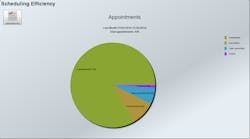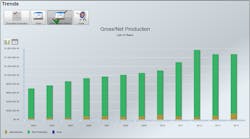Smart business solutions for creating profitable dental practices
Possessing the education, equipment, and knowledge to be a successful dentist is only part of what is required to operate a successful dental practice. Dentists also need to know how to run the business side of the practice. Yet running an effective business practice places additional time demands on dentists and staff, drawing them away from the patient-related tasks. One alternative is to use outsourced partners to take over labor-intensive business functions so that dentists can make their business more successful.
Outsourcing dental business functions
Many dental practices use consultants or outside companies to manage some or all of the day-to-day business aspects of the dental practice. While outsourcing these tasks may be cost effective and economical, the bigger appeals are the time saving features that allow for enhanced business efficiency.
“A lot of dentists come out of school dreaming about doing dentistry and they become disillusioned after a short time learning that not only do they have to do dentistry, they have to run a business,” said Dr. Michael Criscione, owner of Criscione Family Dentistry in Lake Oswego, Oregon. When dentists are overwhelmed with the business aspects of their practices, it’s time to seek help.
When they employ third parties to help with the business aspects, dentists can focus more on their core competencies to enrich patient care. Additionally, outsourcing business functions allows staff to focus their energy on productive practice building tasks to meet their goals and increase profitability.
“I used to work at a family practice that had great doctors who provided quality care with high tech equipment,” said Dr. Claire-Marie Ficsor, owner of Windermere Family Dentistry in Littleton, Colorado. “But the office manager was there Friday night and all day Saturday stuffing envelopes, checking every account, and running every report. The fact that I have the expertise of an entire company working on my behalf 24/7 and freeing up my staff’s time for other duties is worth the fee.”
Most of the business tasks in a dental practice can be outsourced. These include patient scheduling/rescheduling and appointment reminder contact via phone, email and/or text messaging; insurance verification and preauthorization; insurance and patient billing, including any required follow up; installing and maintaining hardware and software; patient data management; patient financing; posting of payments; and accounts receivables collections.
A recent Dental Bites in Apex360 stated, “In an office generating $500,000 in revenue, for every 1% not collected, the practice loses $5,000.”1 A strategic outsource partner can help dentists improve collections and revenue, as well as provide dentists with a steady cash flow throughout the month. “Keeping cash flow even is important. I’ve worked in several dental offices, and cash flow and accounts receivable are problems for everyone,” said Dr. Ficsor. “Having a provider keep that under control is a real advantage. The time savings that come from outsourcing these tasks may allow for adding patients to the schedule, further increasing the profitability of the practice.”
Choosing an outsourced partner
Dentists have many choices when seeking an outsourced partner. For example, they can purchase, finance, lease, or pay a monthly fee for hardware and software. Alternatively, they can look for companies that offer these services. Dentists who are looking for vendors to help with business functions should consider these key factors: cost, reliability, services offered, integration with digital software and hardware, ongoing training and support, and accountability and ability to provide audits of services.
Any glitch with the software or hardware can cost an office valuable time if it interferes with attending to patients’ needs. For example, Dr. Criscione experienced a problem with the practice’s server. “We had a server go down and our vendor got us up and running that day. If I have an issue, their response is always excellent,” he said. Dr. Ficsor agrees with the importance of good training and support. “You’re not alone and doing all of this yourself. They are there to help you. If there’s an issue with the software, they can fix it within minutes. If there’s a hardware problem, they ship out something right away. If there’s a patient account problem, there’s always someone to help you over the phone,” she said.
Another crucial consideration is whether to choose one or multiple providers. At first it may appear that having multiple providers is more cost effective. However, using one vendor provides the office with greater control and responsiveness because the outsourced partner is able to coordinate and integrate all of the services. The office runs more efficiently as a result.
Outsourcing: A winning strategy for dentists, staff, and patients
Most new dentists are overwhelmed with student loan debt when they graduate from dental school. Then they borrow even more to buy a practice, which negatively impacts their profit margin. It should be no surprise that dentists try to cut overhead and take on all the functions of running a practice themselves.
“When I joined my father’s practice, I tried to talk him out of using a vendor for the business tasks,” said Dr. Criscione. “I thought we could get our own software and do our own billing more cheaply. He showed me how using a vendor makes it easier, reduces the billing headaches, and provides a steady cash flow. Those are huge benefits.”
There are proven business tools provided by the industry that make running a dental practice more efficient. By outsourcing these tasks to the experts, dentists can free up more of their time to do what they do best — treat patients.
CONSIDER READING:
Business Basics – A quick guide for dentists
Best financial arrangement options for your dental practice in 2015
Kevin Brady is the president of sales and marketing for First Pacific Corporation (FPC). Founded in 1961, FPC provides a comprehensive set of practice management tools that support both the business and clinical sides of dental practices. For more information, contact FPC at 800-544-2345 or visit firstpac.com.
REFERENCE
1. Apex360 (Dec. 11, 2014). Dental Bites: Practice collections climb to 94.3% in 2014.










